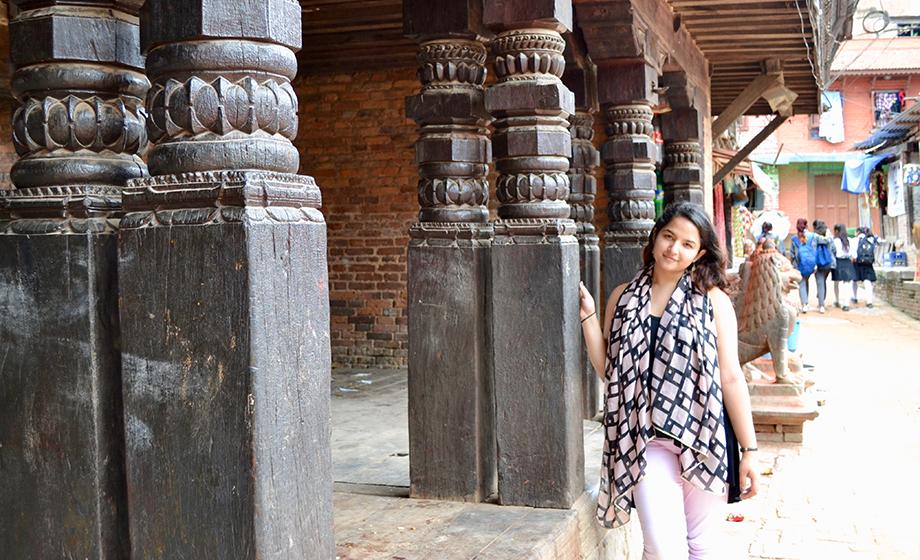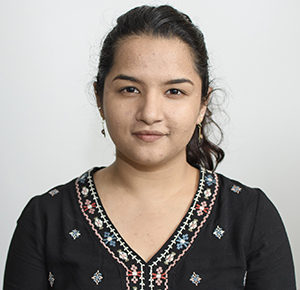
Two years after twin earthquakes struck central Nepal, the country is still feeling the aftereffects. Thousands of residents are living in temporary shelters, and communities are working to rebuild hospitals, roads and other infrastructure.
About Sweta Basnet ’18
Majors: Biochemistry and Molecular Biology; Spanish
Hometown: Concord, N.H.
For Clark University undergraduate Sweta Basnet ’18, a Nepali-American, last summer seemed like the ideal time to return to her native country to work on an issue close to her heart: improving health care for mothers and babies. In particular, she was interested in how prenatal health care varies in rural areas of Nepal versus the cities. She presented her findings in a poster at last week’s Fall Fest, an academic event for undergraduate students at Clark.
As part of her LEEP research project, Basnet interned at the nongovernmental organization (NGO) Possible Health, working at Primary Health Care Center in Charikot, a rural village in the Himalayas. Possible Health has rebuilt more than 20 clinics, including the one in Charikot, since the earthquakes hit Nepal on April 25 and May 12, 2015. The second, 7.3 magnitude quake hit close to Charikot, killing nearly 100 people, injuring more than 2,300 and destroying about 90 percent of the buildings.
Now Primary Health Care Center sees more than 250 people a day. The NGO charged Basnet with preparing an impact report to document achievements and suggest improvements in maternal and neonatal health. She observed conditions in the hospital, as well as the work of community health workers.

After completing her internship in Charikot, Basnet headed to Kathmandu, the country’s capital, with a population of 1.4 million. She volunteered in the neonatal intensive care unit and in gynecology/obstetrics at Paropakar Maternity and Women’s Hospital, researching how health care in a large city hospital compares with that of a rural clinic. Primary Health Care Center sees 60 births a month, while the Kathmandu hospital will have 60 per day. Both facilities provide free health care for those who cannot afford it.
“The most important skill I have learned in my experience is the importance of communication, because it helps the process of teamwork — especially when resources and manpower are not readily available all of the time,” Basnet says. “I found that communication does not only affect co-workers, but also the patients and their families.”
Basnet’s research into maternal and neonatal health was inspired by her grandmothers, both of whom gave birth at home in Nepal. Although she grew up in Concord, N.H., Basnet was born in Nepal. She immigrated with her family to the United States in 2002.
“To this day in Nepal, many births take place in homes, increasing the mother-child mortality rate. More importantly, there is very little education and discussion about family planning, which results in one family having five or six children,” she says. Someday, “I would love to take on the role of educating the public about family planning and helping reduce the maternal and neonatal mortality rates.”
Back at Clark this fall, Basnet is putting her Spanish skills to work, volunteering as an interpreter and mentor for Latino schoolchildren in Worcester. She also plans to help families more easily navigate health care settings.
She hopes her experiences with families in Nepal and Worcester will help her shape a career in health care after graduation. Basnet is considering either optometry or medical school, and hopes to work in a Spanish-speaking country for an NGO that offers free health care, similar to Possible Health.
“This hands-on experience has broadened my horizon because I was able to be in a real-world environment,” she says. “My classes at Clark and my internship in Nepal have helped set in stone that my passion lies in the medical and public health fields.”
Rosie Nguyen ’19 contributed to this story.


